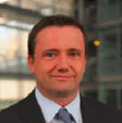With more than $1.5 billion in development costs and 20 years of research on the line, Sanofi ($SNY) is getting revved up to launch its world-first dengue vaccine later this year. And if the company's predictions are correct, the shot will not only be a big deal for patients in the developing world--it'll be a highly profitable product to boot.
By the end of the year, Sanofi expects the vaccine to be licensed in 20 countries with a total population of 1 billion, the Financial Times reported. Where the vaccine is available first will depend on the regulatory approval process--but it's not going to be in the U.S. or Europe.
 |
| Sanofi's Guillaume Leroy |
In the past, Sanofi Pasteur has rolled out vaccines first in those markets, but the group is "flipping the model" this time around to favor wide access, dengue chief Guillaume Leroy said during an April presentation. Sanofi Pasteur CEO Olivier Charmeil told the FT that the potential market ranges from 3 billion to 4 billion people; analysts have predicted up to €1 billion per year in sales.
Plus, Charmeil told the FT, the vaccine will be on Sanofi Pasteur's "high end of profitability."
Already common in middle-income countries in Latin America and Asia, dengue fever has increasingly moved into higher-income nations such as Japan, a trend that could add to the vaccine's uptake and profitability. In anticipation of the launch, Sanofi spent €300 million on a manufacturing facility in Neuville-sur-Saône, France. Capacity there is 100 million vaccines annually, Leroy said during his April presentation, with production expected to start early next year.
Also working on a dengue vaccine is Takeda, which could be battling for market share with its DENVax by 2020, analysts say. Takeda's shot could feature a more convenient dosing schedule and competitive pricing, helping cut down Sanofi's first-to-market advantage. Competitors Merck and GlaxoSmithKline are further off with their candidates.
While vaccines are a lower-margin business that sometimes don't generate as much shareholder interest as pharmaceuticals, some drugmakers have placed an emphasis on them. GlaxoSmithKline in particular has made a big bet on the vaccines field: After completing its asset swap with Novartis--sending away its oncology portfolio and purchasing the Swiss pharma's vaccines--it'll focus on lower-margin businesses that it thinks are on a growth path.
- here's the Financial Times story